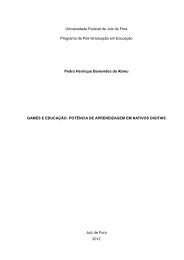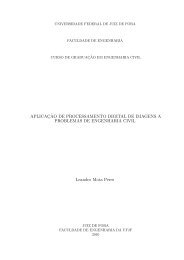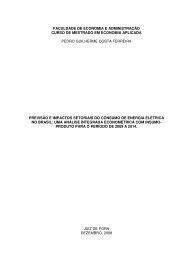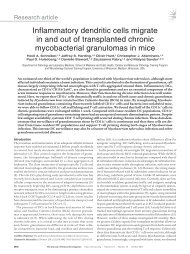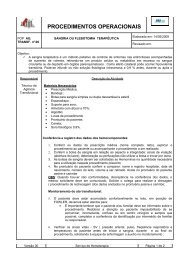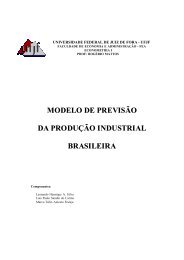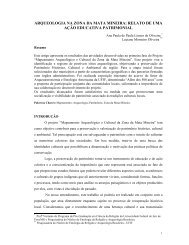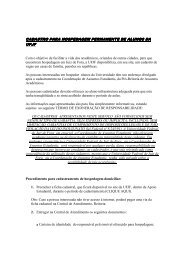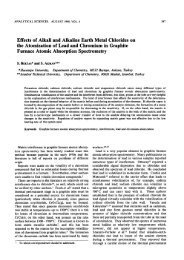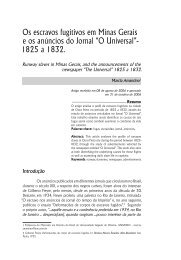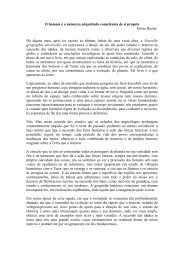Volume 6 | Número 2 Julho - Dezembro de 2012 - Universidade ...
Volume 6 | Número 2 Julho - Dezembro de 2012 - Universidade ...
Volume 6 | Número 2 Julho - Dezembro de 2012 - Universidade ...
Create successful ePaper yourself
Turn your PDF publications into a flip-book with our unique Google optimized e-Paper software.
Psicologia em Pesquisa | UFJF | 6(02) | 121-129 | <strong>Julho</strong>-<strong>Dezembro</strong> <strong>de</strong> <strong>2012</strong><br />
Grainger, J., O’Reagan, J. K., Jacobs, A. M., & Segui,<br />
J. (1989). On the role of competing word units<br />
in visual word recognition: the neighborhood<br />
frequency effect. Perception & Psychophysics, 45,<br />
189-195.<br />
Grainger, J., & Whitney, C. (2004). Does the huamn<br />
mnid raed wrods as a wlohe? Trends in Cognitive<br />
Sciences, 8, 58-59.<br />
Huntsman, L. A., & Lima, S. D. (2002). Orthographic<br />
neighbors and visual word recognition. Journal of<br />
Psycholinguistic Research, 31, 289-306.<br />
Johnston, J. C. (1978). A test of the sophisticated<br />
guessing theory of word perception. Cognitve<br />
Psychology, 10, 123-153.<br />
Justi, F. R., & Justi, C. (2008). As estatísticas <strong>de</strong><br />
vizinhança ortográfica das palavras do português<br />
e do inglês são diferentes? Psicologia em Pesquisa,<br />
2, 61-73.<br />
Justi, F. R. R., & Pinheiro, A. M. V. (2006). O<br />
efeito <strong>de</strong> vizinhança ortográfica no português do<br />
Brasil: acesso lexical ou processamento estratégico.<br />
Interamerican Journal of Psychology, 40, 275-288.<br />
Justi, F. R. R., & Pinheiro, A. M. V. (2008). O efeito<br />
<strong>de</strong> vizinhança ortográfica em crianças brasileiras:<br />
estudo com a tarefa <strong>de</strong> <strong>de</strong>cisão lexical. Interamerican<br />
Journal of Psychology, 42, 559-569.<br />
Justi, F. R. R., & Roazzi, A. (<strong>2012</strong>). Efeitos <strong>de</strong><br />
vizinhança ortográfica no português brasileiro: um<br />
estudo com a tarefa <strong>de</strong> i<strong>de</strong>ntificação perceptual.<br />
Psicologia: Reflexão e Crítica, 25, 301-310.<br />
Laxon, V., Gallagher, A., & Masterson, J. (2002). The<br />
effects of familiarity, orthographic neighbourhood<br />
<strong>de</strong>nsity, letter-length and graphemic complexity<br />
on children’s reading accuracy. British Journal of<br />
Psychology, 93, 269-287.<br />
McClleland, J., & Rumelhart, D. (1981). An<br />
interactive activation mo<strong>de</strong>l of context effects<br />
in letter perception: Pt. 1, an account of basic<br />
findings. Psychological Review, 88, 375-407.<br />
Paap, K. R., Johansen, L. S., Chun, E., & Vonnahme,<br />
P. (2000) Neighborhood frequency does affect<br />
performance in the Reicher task: encoding or<br />
Decision? Journal of Experimental Psychology:<br />
Human Perception and Performance, 26, 1691-<br />
1720.<br />
Perea, M., Carreiras, M., & Grainger, J. (2004).<br />
Blocking by word frequency and neighborhood<br />
<strong>de</strong>nsity in visual word recognition: a task-specific<br />
response criteria account. Memory & Cognition,<br />
32, 1090-1102.<br />
Raaijmakers, J. G. W., Schrijnemakers, J. M. C.,<br />
& Gremmen, F. (1999). How to <strong>de</strong>al with<br />
“the language-as-fixed-effect fallacy”: common<br />
misconceptions and alternative solutions. Journal<br />
of Memory and Language, 41, 416-426.<br />
Reicher, G. M. (1969). Perceptual recognition as a<br />
function of meaningfulness of stimulus material.<br />
Journal of Experimental Psychology, 81, 275-280.<br />
Slattery, T. J. (2009). Word misperception, the<br />
neighbor frequency effect, and the role of sentence<br />
context: evi<strong>de</strong>nce from eye movements. Journal of<br />
Experimental Psychology: Human Perception and<br />
Performance, 35, 1969-1975.<br />
Wheeler, D. (1970). Processes in word recognition.<br />
Cognitive Psychology, 1, 59-85.<br />
Whitney, C. (2001) How the brain enco<strong>de</strong>s the or<strong>de</strong>r<br />
of letters in a printed word: the SERIOL mo<strong>de</strong>l<br />
and selective literature review. Psychonomic Bulletin<br />
& Review, 8, 221-243.<br />
Whitney, C., & Cornelissen, P. L. (2008) SERIOL<br />
reading. Language and Cognitive Processes, 23, 143-<br />
164.<br />
Whitney, C., & Lavidor, M. (2005) Facilitative<br />
orthographic neighborhood effects: the SERIOL<br />
mo<strong>de</strong>l account. Cognitive Psychology, 51, 179-213.<br />
En<strong>de</strong>reço para correspondência:<br />
Cláudia Nascimento Guaraldo Justi<br />
Departamento <strong>de</strong> Psicologia – Universida<strong>de</strong> Fe<strong>de</strong>ral<br />
<strong>de</strong> Juiz <strong>de</strong> Fora<br />
Rua José Lourenço Kelmer, s/n<br />
CEP 36036-900 – Juiz <strong>de</strong> Fora/MG<br />
E-mail: coglin.gp@gmail.com<br />
Recebido em 22/02/<strong>2012</strong><br />
Revisto em 27/08/<strong>2012</strong><br />
Aceito em 22/10/<strong>2012</strong><br />
* Esse trabalho integra uma série <strong>de</strong> estudos que <strong>de</strong>u origem à tese<br />
<strong>de</strong> doutorado do autor Francis Ricardo dos Reis Justi, que recebeu<br />
bolsa <strong>de</strong> estudos do Conselho Nacional <strong>de</strong> Desenvolvimento<br />
Científico e Tecnológico (CNPq).<br />
Justi, F. R. R. & Justi, C. N. G. 129



